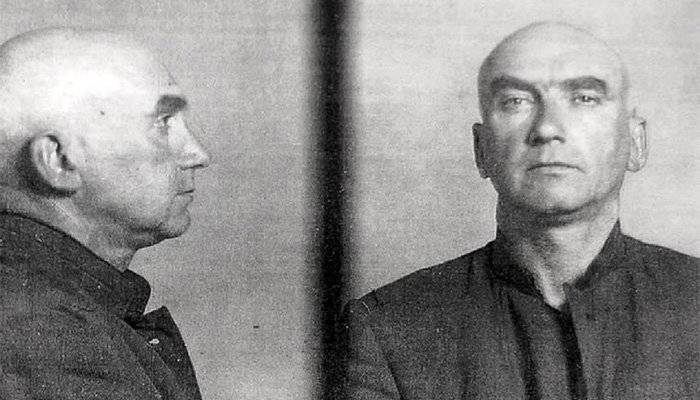YAKOV BRONIN.
No KV3/350 file.
In the USSR, the practice of exchanging "spies" was used already in the 1930s. Then the Soviet Union was actively helping out its intelligence officers who worked in China. The most famous case is associated with the exchange of Yakov Bronin for Jiying Jingguo. Jingguo was arrested in Sverdlovsk after the arrest in Shanghai of Yakov Bronin. Bronin from 1933 to 1935 was a resident of Soviet intelligence in China. In this post, he replaced the famous Soviet intelligence officer Richard Sorge.
Yakov Bronin was arrested by China's counterintelligence and sentenced to 15 years in prison. From 1935 to 1937, he was held in a prison in the Chinese city of Wuhan, the existence of which today is already known to every inhabitant of our planet. In 1937, Bronin was exchanged for Jiying Jingguo. It is worth noting that the latter was not an ordinary Chinese, he was the son of Marshal Chiang Kai-shek.
He moved to the USSR back in 1925. The 15-year-old son of the leader of the Kuomintang party arrived in the Soviet Union to study and built a successful career, having learned Russian and received an education, joined the Komsomol. In the USSR, he took the name Nikolai Vladimirovich Elizarov. In 1932 he moved to Sverdlovsk, where he worked at Uralmash, and was also the editor of the newspaper For Heavy Engineering. In the same place in Sverdlovsk, he married Faina Vakhreva and became the father of two children.
It is believed that the USSR leadership decided to go for an exchange only after an unsuccessful attempt to free the Soviet resident during special operations. Then it was decided to go the other way. The son of Marshal Chiang Kai-shek was arrested in Sverdlovsk. This was followed by an offer, which Chiang Kai-shek could not refuse, and in March 1937, the marshal's son was exchanged for the Soviet intelligence officer Yakov Bronin.
It is worth noting that both in life everything worked out quite well. Yakov Bronin, returning to the USSR, did not fall into the millstones of the Great Terror, which engulfed his immediate superior, Yan Berzin, and hundreds of high-ranking Soviet intelligence officers. At the same time, in 1949 he was still repressed, but rehabilitated in 1955. A native of the city of Tukums, he lived a long life, Yakov Bronin died in 1984.
Source: https://en.topwar.ru
In the USSR, the practice of exchanging "spies" was used already in the 1930s. Then the Soviet Union was actively helping out its intelligence officers who worked in China. The most famous case is associated with the exchange of Yakov Bronin for Jiying Jingguo. Jingguo was arrested in Sverdlovsk after the arrest in Shanghai of Yakov Bronin. Bronin from 1933 to 1935 was a resident of Soviet intelligence in China. In this post, he replaced the famous Soviet intelligence officer Richard Sorge.
Yakov Bronin was arrested by China's counterintelligence and sentenced to 15 years in prison. From 1935 to 1937, he was held in a prison in the Chinese city of Wuhan, the existence of which today is already known to every inhabitant of our planet. In 1937, Bronin was exchanged for Jiying Jingguo. It is worth noting that the latter was not an ordinary Chinese, he was the son of Marshal Chiang Kai-shek.
He moved to the USSR back in 1925. The 15-year-old son of the leader of the Kuomintang party arrived in the Soviet Union to study and built a successful career, having learned Russian and received an education, joined the Komsomol. In the USSR, he took the name Nikolai Vladimirovich Elizarov. In 1932 he moved to Sverdlovsk, where he worked at Uralmash, and was also the editor of the newspaper For Heavy Engineering. In the same place in Sverdlovsk, he married Faina Vakhreva and became the father of two children.
It is believed that the USSR leadership decided to go for an exchange only after an unsuccessful attempt to free the Soviet resident during special operations. Then it was decided to go the other way. The son of Marshal Chiang Kai-shek was arrested in Sverdlovsk. This was followed by an offer, which Chiang Kai-shek could not refuse, and in March 1937, the marshal's son was exchanged for the Soviet intelligence officer Yakov Bronin.
It is worth noting that both in life everything worked out quite well. Yakov Bronin, returning to the USSR, did not fall into the millstones of the Great Terror, which engulfed his immediate superior, Yan Berzin, and hundreds of high-ranking Soviet intelligence officers. At the same time, in 1949 he was still repressed, but rehabilitated in 1955. A native of the city of Tukums, he lived a long life, Yakov Bronin died in 1984.
Source: https://en.topwar.ru
